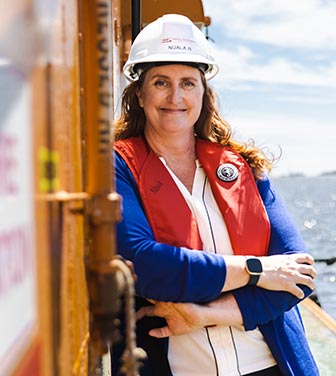Championing Safety: One Woman's Inspirational Career Change After Personal Loss
Author: UNB College of Extended Learning
Posted on Nov 14, 2023
Category: Occupational Health and Safety , Professional Development , Our Stories , Online Learning

Nuala Reilly is a role model for anyone interested in the Health and Safety field.
She spent most of her working adult life in industries that helped people who had suffered a significant loss in life. She worked for Employment Ontario, assisting people who had experienced job loss. When she moved to Saint John, New Brunswick, she spent several years working for an insolvency trustee company, working with people experiencing financial difficulties before spending a few years working in a medical office.
The pivotal point in her career was when her cousin died in a workplace incident. She decided that she wanted to get into Health, Safety, and Environment (HSE), and help people prevent the ‘big awful’ from happening. She wanted to switch her focus from working in industries that dealt with the aftermath of major life events to something proactive, inspiring and life-affirming.
While in her mid-forties, Reilly went back to school to follow her passion.
The University of New Brunswick’s Occupational Health and Safety (OHS) programs ticked all the right boxes in terms of institutional reputation, program quality and instructor expertise.
“When you do some investigating, it’s not hard to see that the program at UNB is one of the tops in North America,” said Reilly. The online format was a huge advantage for Reilly, providing her with the flexibility she needed to fit learning into her busy life. “I started the program while I was still in a full-time college program, and I’m in my last stretch now while working full time.”
 Today, Reilly is a Health, Safety, Security and Environment (HSSE) Specialist at Harbour Development, a J.D. Irving, Limited company. When she started, she saw Harbour Development as a new challenge and fresh off her training, she saw new opportunities for the business’ safety culture. She wanted to refresh their safety program, requiring both the support of the team and crews and their trust.
Today, Reilly is a Health, Safety, Security and Environment (HSSE) Specialist at Harbour Development, a J.D. Irving, Limited company. When she started, she saw Harbour Development as a new challenge and fresh off her training, she saw new opportunities for the business’ safety culture. She wanted to refresh their safety program, requiring both the support of the team and crews and their trust.
After seven months, with the support of crew members and the leadership team, she re-wrote most of their programs; she changed the onboarding and orientation process to include a step-buddy system where new crew members would be matched with a veteran employee who had to sign off on their training before being considered full crew.
Because the crews have a significant hiatus between their dredge seasons, she implemented a seasonal re-orientation, which included a drilling day to run all of their safety drills with the whole crew and leadership. She built in-house tracking systems for compliance – implementing a QR code posted on all company vessels that the crew can use to report hazard identifications, incidents and near misses. Reilly believes it is important for crews to report both the wins and the hazards, so she also included a spot to enter the safe actions. Today, all data is tracked and stats are shared with leadership.
Reilly enjoys training and presenting, and she especially loves talking to a group about their safety needs and can see the moment when they ‘get it’. She spends time on board with her crews to strengthen their personal connections. She loves building connections with other people in the industry, specifically women. This past year, she started a monthly breakfast program for women in safety who work with the port, where they can share resources and ideas and connect.
Most of Reilly’s professional life has been in support-type roles that specifically work with people in crisis or in need. Now she gets to be on the other side of that fence, doing everything she can to help people avoid a crisis.
“If my role in safety is a painting, programs like UNB’s COHS and DOHS are the framework that hold the canvas in place and give me the stability and the structure to create something bespoke to my world.”
What’s next for Reilly?
Her immediate plans include completing the final few courses in UNB’s Diploma in Occupational Health & Safety and obtaining her Canadian Registered Safety Technician (CRST®) certification. She credits UNB’s CRST® Exam Preparation course for properly preparing her to write the rigorous examination.
For more information about UNB’s OHS programs, visit go.unb.ca/about-ohs or contact us at customerservice@unb.ca.